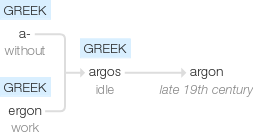Argon
来自Big Physics
late 19th century: from Greek, neuter of argos ‘idle’, from a- ‘without’ + ergon ‘work’.
wiktionary
From Ancient Greek ἀργόν(argón), neuter of ἀργός(argós, “idle, lazy”), because of its inertness.
etymonline
argon (n.)
chemical element, 1894, Modern Latin, from Greek argon, neuter of argos "lazy, idle, not working the ground, living without labor," from a- "without" (see a- (3)) + ergon "work," from PIE root *werg- "to do." So called by its discoverers, Baron Rayleigh and Sir William Ramsay, for its inert qualities. They described it as "most astonishingly indifferent."
